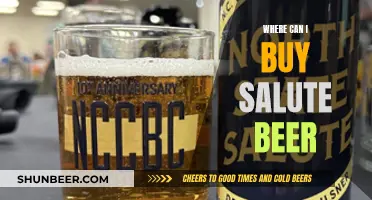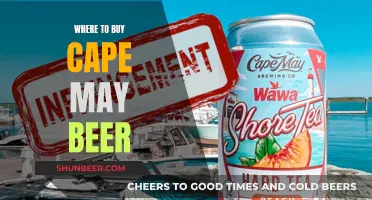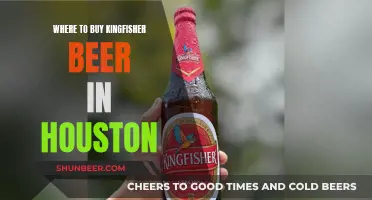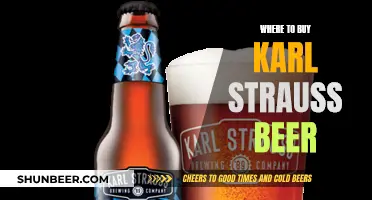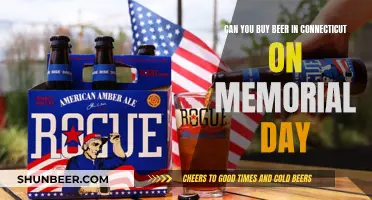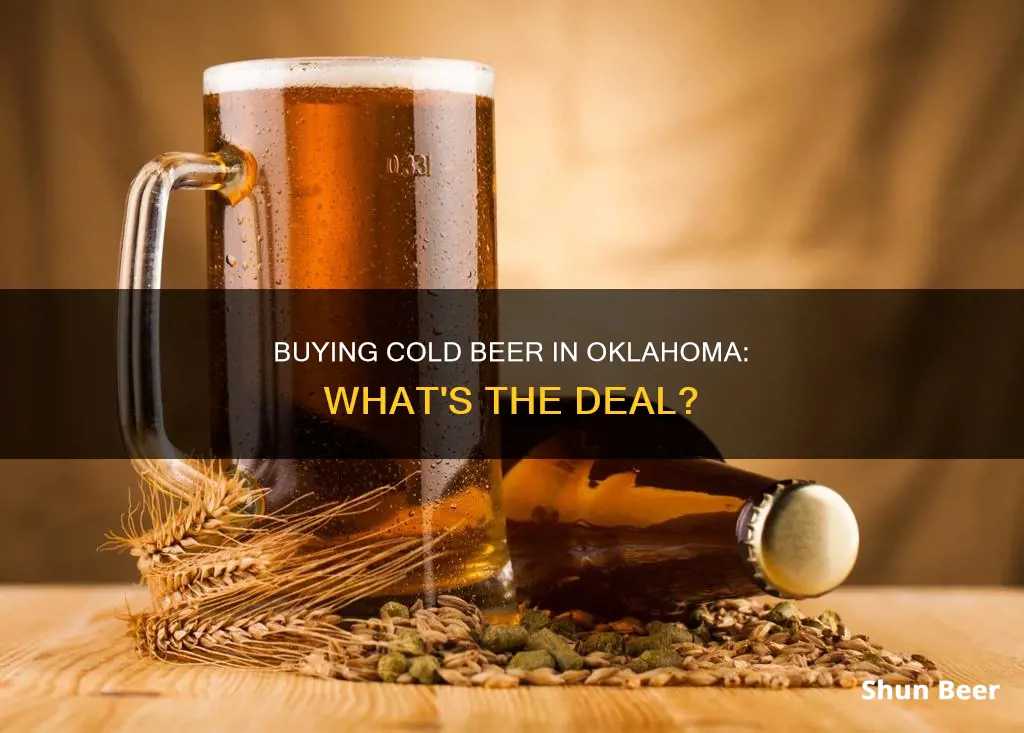
Oklahoma has historically had some of the strictest liquor laws in the country, with the prohibition of alcohol written into its state constitution when it became a state in 1907. While voters repealed total prohibition in 1959, it was only in 2016 that Oklahoma voted to allow the sale of full-strength beer and wine in grocery stores, with the changes taking effect in 2018. So, can you buy cold beer in Oklahoma?
| Characteristics | Values |
|---|---|
| Can you buy cold beer in Oklahoma? | Yes, since 2018, grocery and convenience stores have been allowed to sell cold beer with an ABV of up to 8.99%. |
| Who can sell cold beer? | Grocery, convenience, and drug stores. |
| Who regulates the sale of alcohol in Oklahoma? | Alcoholic Beverage Laws Enforcement Commission (ABLE) |
| When did Oklahoma repeal prohibition? | 1959 |
| When did Oklahoma allow liquor by the drink? | 1984 |
| When did Oklahoma allow the sale of strong beer and wine in grocery stores? | 2016 |
| What is the legal drinking age in Oklahoma? | 21 |
| Can minors consume alcohol in a private setting? | Yes |
| Can minors possess or purchase alcohol? | No |
What You'll Learn

Oklahoma's strict liquor laws
Oklahoma has some of the strictest liquor laws in the United States. When the state joined the union in 1907, its constitution prohibited alcohol. While the Federal government repealed the 18th Amendment in 1933, Oklahoma did not ratify the 21st Amendment. Instead, it approved the Oklahoma Beer Act, which allowed the sale of beer with a maximum alcohol content of 3.2%.
In 1959, Oklahoma repealed total prohibition, and in 1984, it became the 49th state to allow liquor by the drink. However, until 2016, the state maintained a ban on the sale of "real beer", with most beers, wines, and liquors only available in licensed liquor stores and sold at room temperature.
In 2016, Oklahoma voters passed State Question 792, which significantly reformed the state's alcoholic beverage laws. The new law allowed grocery, convenience, and drug stores to sell cold regular beer and wine. Liquor stores were also permitted to sell cold full-strength beer, wine, and spirits, as well as non-alcoholic items. Additionally, the new law allowed for the direct shipment of wine to Oklahoma residents from in-state or out-of-state wineries.
Despite these reforms, Oklahoma still has several strict regulations regarding alcohol. Liquor stores are required to be closed on Sundays and certain holidays, and alcohol sales are prohibited on Thanksgiving and Christmas Day. Alcohol may not be sold for consumption on-premises between 2:00 a.m. and 7:00 a.m., and licensed vendors are prohibited from advertising happy hours, serving more than two beverages at a time to a customer, or giving discounts. Oklahoma also has strict laws regarding underage drinking, making it a felony to provide alcoholic beverages to minors and imposing penalties for those who do so.
Buying Beer at Alabama Football Games: What's the Deal?
You may want to see also

The Alcohol Beverage Laws Enforcement Commission
Until recently, Oklahoma had strict laws regarding the sale of alcohol, with only licensed liquor stores allowed to sell beer, wine, and liquor with an alcohol content above 3.2%. These drinks could only be sold at room temperature, and liquor stores were not permitted to open on Sundays or certain holidays. Grocery and convenience stores could only sell low-point beer with an alcohol content of 3.2% or less, although these drinks could be refrigerated and sold on Sundays.
In 2016, Oklahoma voters approved State Question 792, which made significant changes to the state's alcohol laws. This measure allowed grocery, convenience, and drug stores to sell cold regular beer and wine (up to 8.99% alcohol content for beer and 15% alcohol content for wine). Liquor stores are now also permitted to sell cold full-strength beer, wine, and spirits, as well as non-alcoholic products. These changes went into effect in 2018, giving businesses time to make the necessary adjustments.
The ABLE Commission is responsible for implementing and enforcing these new rules, which have expanded the sale of alcohol in Oklahoma. The commission sets licensing, distribution, and enforcement regulations for the sale of alcohol in the state. The passage of State Question 792 also put all oversight and licensing under the ABLE Commission, including for low-point beer sales, which were previously handled by the Oklahoma Tax Commission.
Best Places to Buy Eight Beers
You may want to see also

The 2016 vote to repeal Prohibition-era laws
In 2016, Oklahoma passed State Question 792, a vote to repeal Prohibition-era laws. The vote was a comprehensive reform of the state's alcoholic beverage laws, allowing grocery and convenience stores, gas stations, and pharmacies to sell strong beer and wine. The new laws also allowed liquor stores to sell cold beverages and non-alcoholic items.
The 2016 vote was not the first time Oklahoma had repealed Prohibition-era laws. In 1933, the state voted to approve the sale of beer, with the Oklahoma Beer Act of 1933. However, this only applied to low-point beer, defined as beer containing no more than 3.2% alcohol by weight. It was not until 1959 that Oklahoma fully repealed Prohibition, with voters deciding to allow the sale of liquor in package containers. Even then, liquor by the drink was not permitted until 1984, and it was not until 2016 that grocery and convenience stores were allowed to sell strong beer.
The 2016 vote was significant because it brought Oklahoma more in line with the rest of the country regarding alcohol sales. Before the vote, the state had some of the strictest liquor laws in the nation, with only a few other states, including Utah, Minnesota, and Kansas, maintaining similar restrictions. The vote also had economic implications, as it was expected to increase tax revenue and encourage major domestic brewers and craft brewers to sell their products in Oklahoma for the first time in decades.
Despite the changes brought about by the 2016 vote, Oklahoma still has some unique alcohol laws. For example, liquor stores are required to be closed on certain holidays, and it is illegal to consume alcohol in public or to be drunk in public. Additionally, minors under the age of 21 are prohibited from possessing or purchasing alcohol, although consumption in a "private setting" is not prohibited.
Beer and Tax Exempt Cards: Can I Buy?
You may want to see also

The impact on small liquor stores
Oklahoma has historically had some of the strictest liquor laws in the country. The state's constitution included a total prohibition of alcoholic beverages when it was admitted to the union in 1907. While prohibition was repealed in 1933, Oklahoma did not ratify the 21st Amendment and instead approved the sale of low-point beer (not more than 3.2% alcohol by weight) with the Oklahoma Beer Act of 1933.
In 1959, Oklahoma voters repealed total prohibition, but it wasn't until 1984 that liquor-by-the-drink bars were allowed. Even then, liquor stores could only sell full-strength beer at room temperature, and it wasn't until 2016 that voters approved the sale of cold beer and wine in grocery and convenience stores.
The impact of these changing laws on small liquor stores has been significant. For many years, small liquor stores benefited from being the only outlets allowed to sell full-strength beer and wine. However, with the relaxation of alcohol laws, small liquor stores now face increased competition from grocery and convenience stores.
Some argue that this increased competition will lead to the closure of many small liquor stores. Bryan Kerr, president of the Retail Liquor Association of Oklahoma, predicted that half of the state's approximately 600 local retail package stores would go out of business if the laws were changed. He and other opponents of the changes also argue that revenue from alcohol sales will go to large, out-of-state retail chains rather than staying in Oklahoma's economy.
On the other hand, proponents of the law changes argue that they will strengthen small businesses and give consumers more choice. They also point out that 41 other states already allowed the sale of strong beer and wine in grocery stores before Oklahoma made the change.
In addition to changing where alcohol can be purchased, the new laws also affect how it can be marketed and sold. For example, liquor stores are now allowed to sell other products, such as food and bottle openers, as long as these sales don't exceed 20% of their monthly revenue. The laws also changed the age requirements for employees who sell alcohol, requiring employees at grocery and convenience stores to be at least 18, and employees at liquor stores to be at least 21.
Overall, while the impact of the law changes on small liquor stores in Oklahoma is complex and multifaceted, it is clear that these businesses now face a significantly different landscape than they did before.
Buying Beer on Sundays in Guntersville, Alabama: What's Allowed?
You may want to see also

The sale of cold beer in grocery stores
In 2016, Oklahoma voted to allow grocery stores to sell full-strength beer and wine, marking a significant shift in the state's alcohol laws. This change took effect in October 2018, enabling grocery stores to sell cold beer with an alcohol content of up to 8.99% and wine of up to 15% ABV. Prior to this, grocery stores in Oklahoma could only sell low-point beer, which is beer with an alcohol content of 3.2% or less.
The ability to sell cold, full-strength beer and wine in grocery stores was made possible by State Question 792, which amended the state's constitution. This amendment gave the Legislature the authority to create new rules regarding alcohol sales, leading to a more modern and consumer-friendly approach. The change was supported by various organisations, including the Oklahoma Beer Alliance, the Oklahoma Grocers Association, and Oklahomans for Consumer Freedom.
The new legislation had a two-year delay, giving stores time to make logistical changes and allowing the Legislature to make any necessary adjustments. This transition period ensured a smooth implementation of the updated alcohol laws in Oklahoma.
It is worth noting that while the sale of cold beer in grocery stores is now permitted, there are still regulations in place regarding the sale of alcohol to minors, with employees handling or selling beer or wine required to be at least 18 years old. Additionally, penalties for selling alcohol to underage individuals remain in place, with the first violation resulting in a misdemeanor charge and a fine of up to $500.
Buying Beer with Food Stamps: Florida's Legal Loophole
You may want to see also
Frequently asked questions
Yes, you can buy cold beer in Oklahoma.
Grocery stores, gas stations, and pharmacies with a beer and wine license can sell cold beer in Oklahoma.
Yes, establishments with a beer and wine license can sell beer with up to 15% ABV.
Yes, cold beer can be sold from 7 am to 2 am the following day.
Yes, it is illegal to sell alcohol to anyone under 21 years old in Oklahoma. The penalty for a first violation is a fine of up to $500 and a year in jail. Subsequent violations are considered felonies and can result in a fine of between $2,500 and $5,000 and up to five years in prison.



